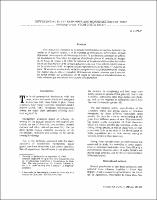Respuesta de plantas diferenciales y morfometría de algunos Meloidogyne spp. de Costa Rica
Fecha de publicación
10-1984Autor
López, R
Objetivos de desarrollo sostenible
ODS 4 - Educación de calidad
Tipo
Artículo
Metadatos
Mostrar el registro completo del ítemTítulo alternativo
Differential plant responses and morphometrics of some Meloidogyne spp. from Costa Rica
Resumen
Con base en los resultados de un estudio morfométrico de machos, hembras y juveniles en el segundo estadio, y en la respuesta de siete plantas diferenciales, se pudo diferenciar cinco especies de Meloidogyne entre 16 poblaciones colectadas en diferentes localidades de Costa Rica. Las especies identificadas fueron M. arenaria, M. incognita. M hapla M. exigua y Ni salasi. La respuesta de las plantas diferenciales dio evidencia de que la población de M. arenaria pertenece a la rata 2 (no infecto maní ) y que entre las poblaciones de M incógnita existían representantes de las razas 1 y 2 de esta especie. Se encontró evidencia de variación patogénica en dos poblaciones de M. exigua, par cuanto una de ellas se reprodujo fácilmente en tomate, mientras que la otra no. En forma similar, dos poblaciones de M. hapla se reprodujeron abundantemente en chile, mientras que la tercera lo hizo pero solo levemente. Based on the results of a morphometric study of males, females and juveniles in the second instar, and on the response of seven differential plants, five species of Meloidogyne could be differentiated among 16 populations collected in different localities of Costa Rica. The species identified were M. arenaria, M. incognita. M hapla M. exigua and Ni salasi. The response of the differential plants gave evidence that the population of M. arenaria belongs to race 2 (non-infecting peanut) and that among the populations of M. incognita there were representatives of races 1 and 2 of this species. Evidence of pathogenic variation was found in two populations of M. exigua, one of which reproduced readily on tomato, while the other did not. Similarly, two populations of M. hapla reproduced abundantly on chili, while the third reproduced only slightly.
Palabras clave
Representación
Sede Central
Editor
Instituto Interamericano de Cooperación para la Agricultura (IICA)
Es parte de
Turrialba; Vol. 34, no. 4
Status
openAccess
URI (Enlace permanente para citar o compartir este ítem)
https://repositorio.catie.ac.cr/handle/11554/11951Colecciones
- Turrialba [532]


